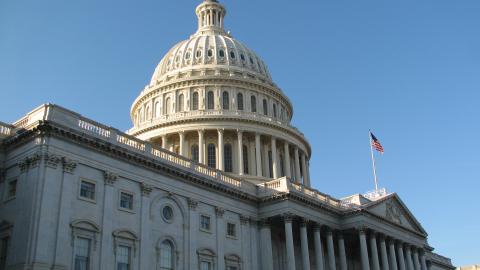The House recently passed a bill, dubbed the Fiscal Responsibility Act, that will stave off the current debt ceiling crisis and, per the CBO, reduce federal deficits over the next decade by $1.5 trillion. Regardless of how they decided to vote on the bill, many House members wanted, and still want, to reduce discretionary spending and curtail future borrowing.
Yet, as the saying goes, the more things change, the more they stay the same.
As it turns out, just a few days prior to the debt ceiling standoff, the House Energy and Commerce Committee voted unanimously—perhaps unwittingly—to increase discretionary spending and federal borrowing via H.R. 3565, the Spectrum Auction Reauthorization Act of 2023.
There is much to like in the legislation, as one would expect for a unanimously-passed bill sponsored by Chair Rogers and Ranking Member Pallone. Reauthorizing spectrum auctions is certainly a good and necessary idea. But, as has happened in the past, this bill contains some particularly bad ideas. Chief among them would be the creation of what is essentially a $23 billion Ponzi scheme of new government spending.
Here’s how it would work. First, the bill would authorize the FCC to borrow more than $3 billion from the U.S. Treasury. As for the NTIA, it would be allowed to borrow $200 million, also from the Treasury.
Second, the bill would then authorize the FCC to sell large swaths of federally-owned radio spectrum rights, which are public assets currently owned the government. The proceeds from these auctions would be in the many, many billions of dollars.
Third, following the FCC auctions, the bill would require the proceeds to be distributed in a specific way. Off the top, over $3.2 billion would be returned to the Treasury to essentially pay back the initial FCC and NTIA loans from step one. Beyond that, $19.8 billion would be directed to NTIA, including $14.8 billion to implement a “new 911” program and $5 billion for a new “middle-mile” program.
While potentially well-intentioned, this is a particularly bad idea. For starters, the FCC is an independent agency, and it does not usually have borrowing authority, much less $3 billion worth. Its operating budget is typically only a few hundred million dollars. Rather than appropriating additional funds for an agency, Congress is instead giving it borrowing authority; yet the net result is the same.
The bill also deprives taxpayers of the full benefit of selling public assets. The spectrum rights that would be auctioned off under this bill are owned by the federal government; therefore, the proceeds from their sale should go entirely to the Treasury. Instead, the bill mandates those proceeds be spent on specific pet projects.
If this all sounds like new discretionary spending and borrowing, that’s because it is—$23 billion’s worth, to be precise. Such new spending is inconsistent with the House’s debt ceiling bill, which aims to freeze discretionary spending and limit borrowing.
Some critics have suggested that the House debt ceiling bill is a sham and that Congress will continue to spend willy-nilly on discretionary programs. Speaker McCarthy says otherwise, claiming that the bill will freeze new discretionary federal spending. Yet this spectrum bill is a prime example of such new discretionary spending.
If he wants to preserve the integrity of the Fiscal Responsibility Act and the political credibility of the House members who voted for it, Speaker McCarthy should insist that the Rules Committee block any legislation that would increase—or even have the appearance of increasing—discretionary federal spending or borrowing. Otherwise, regrettably, his critics will be proven right.
















